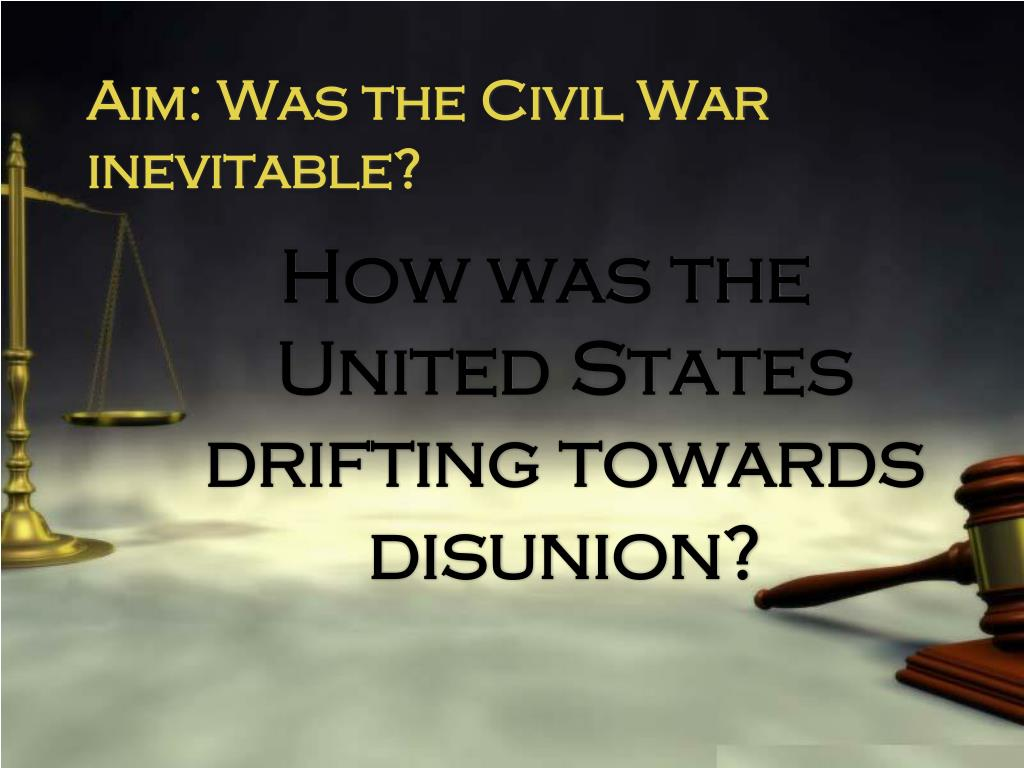The question of Civil War Inevitability permeates American history, sparking debates among historians and enthusiasts alike. Rooted deeply in the clash between states’ rights and federal authority, along with the ever-contentious issue of slavery, the causes of the Civil War are complex and multifaceted. As President Lincoln grappled with his role in the Civil War, striving for a union while wrestling with the morality of slavery, the nation found itself teetering on the brink of conflict. The effects of the Civil War reshaped America, highlighting the disastrous consequences of an unresolved union. This historical analysis reveals the inevitable journey towards war, influenced by social, economic, and political tensions that could no longer be suppressed.
The inevitability of conflict during America’s tumultuous pre-Civil War era raises profound inquiries regarding national identity and ethical governance. As the struggle between Northern abolitionist sentiments and Southern pro-slavery attitudes intensified, the underlying fractures within the fabric of society became more apparent. The historical implications of such strife not only emphasize the pivotal role of leaders like Lincoln but also illustrate how deeply entrenched views on freedom and rights culminated in war. Analyzing the period’s complexities sheds light on how critical decisions and missed opportunities shaped the trajectory toward discord. Ultimately, exploring this unavoidable clash invites a broader understanding of the legacy of war and the persistent battles over liberty that persist even today.
The Causes of the Civil War: Understanding the Roots of Conflict
The causes of the Civil War intertwine with deep-seated issues such as slavery, state rights, and economic disparities between the North and the South. Disagreements over the expansion of slavery into new territories intensified the divisions, ultimately leading to the southern states’ secession. The moral and legal debates surrounding slavery polarized the nation, as abolitionists in the North fought passionately against the institution while many in the South viewed it as essential to their way of life. Understanding these roots is crucial for comprehending how tensions escalated to the point of armed conflict.
Additionally, the cultural differences between the North and South further fueled animosities. The South’s agrarian economy relied heavily on enslaved labor, while the North was becoming increasingly industrialized and urbanized. This economic dichotomy created not only a clash of interests but also a clash of values. The question of whether the federal government had the right to regulate slavery became a contentious issue that ultimately led to the war. Examining these underlying causes provides insight into the inevitability of the Civil War, showcasing how deeply entrenched social and economic structures can influence a nation’s trajectory.
Lincoln’s Role in the Civil War: A Leader’s Transformation Through Crisis
Abraham Lincoln’s role in the Civil War is often discussed in the context of his transformation from a president grappling with the complexities of the Union to a determined leader committed to emancipation. Initially, Lincoln’s primary objective was to preserve the Union rather than to abolish slavery outright. His famous Emancipation Proclamation, issued in 1863, marked a pivotal moment in the war, reframing the conflict as a fight not just for the Union, but for the freedom of enslaved people. This shift not only brought moral clarity to the Union’s cause but also helped to solidify support from abolitionists and freedmen alike.
Lincoln’s leadership during the Civil War exemplifies the idea that actions taken during crises can often reflect deeper moral convictions. Though he faced immense pressure from various factions within society, his decisions, such as the commitment to enlist African American soldiers, showcased his evolving understanding of the war’s complexities. Lincoln’s strategic maneuvers—balancing military necessity with ethical considerations—highlight his pivotal role in shaping the war’s historical narrative. The changes he instituted had lasting effects not only on the outcome of the Civil War but also on the nation’s evolving stance towards slavery.
Civil War Historical Analysis: Lessons from the Past
Civil War historical analysis reveals the intricate layers of motivations and consequences that surround this pivotal conflict in American history. By examining primary sources, such as speeches, letters, and military records, historians can better understand the socio-political landscape of the time. Such an analysis reveals not only the strategies and battles fought but also the human stories of those involved, including soldiers and civilians. The ability to glean insights from these narratives is essential in grasping the full scope of the Civil War and its lasting impact on our national consciousness.
Moreover, analyzing the Civil War helps illuminate the patterns of conflict that can arise in societies grappling with profound differences. By studying the decisions made by leaders, such as Lincoln, and the reactions of the populace, we can draw parallels with contemporary issues of division and conflict. Lessons from the Civil War urge us to reflect on how moral courage, communication, and empathy might alter the course of conflicts before they escalate to violence. Such an analysis is crucial not just for understanding the past but also for shaping a more cohesive future.
The Effects of the Civil War: A Nation Transformed
The effects of the Civil War were profound and far-reaching, shaping the trajectory of the United States in ways that are still felt today. The war resulted in the preservation of the Union, but it also marked a significant transformation in the nation’s approach to civil rights. The Thirteenth, Fourteenth, and Fifteenth Amendments brought about legal changes that aimed to protect the rights of the formerly enslaved populace, even though the reality of these changes would take years to manifest in practice. The struggle for equality initiated during and after the Civil War laid the groundwork for future civil rights movements.
Furthermore, the economic consequences of the Civil War were significant, particularly for the South, which faced devastation and a long recovery process. The war altered the landscape of American society, shifting the social order, as formerly enslaved individuals sought to redefine their lives as free citizens. The challenges of Reconstruction reflected both the potentials and setbacks of integrating formerly divided factions of society. Understanding the sweeping effects of this era helps contextualize ongoing racial and economic disparities, prompting reflection on how historical injustices continue to echo through American life.
Civil War and Slavery: Unraveling the Knot of Human Rights
The interconnection between the Civil War and slavery is central to understanding the American struggle for human rights. The institution of slavery was not just a legal framework but a reality that permeated every aspect of life in the U.S., particularly in the South. The conflict that erupted in 1861 was fundamentally a battle over the continuation and expansion of this institution. Abolitionist sentiments gained momentum, resulting in a moral imperative that would challenge the very fabric of American society. Recognizing the role that slavery played in igniting the Civil War offers a deeper insight into the motivations behind the conflict.
Post-war, the legacy of slavery continued to haunt the nation, as the fight for civil rights transformed into a task not just of emancipation but of equality and justice. The Civil War’s end marked a significant, albeit tumultuous, shift—slaves were freed, but systemic racism persisted. The war initiated dire debates about race relations and human rights, laying the foundation for future civil rights struggles. This ongoing dialogue about the consequences of slavery illustrates that while the Civil War may have ended, the battle for true equality was only beginning.
Understanding the Legacy of the Civil War: Implications for Today
The legacy of the Civil War extends beyond its immediate aftermath, influencing contemporary discussions around race, identity, and governance in America. For many, the war is a symbol of conflict — a reflection of the nation’s unresolved tensions regarding civil liberties and equality. The ways in which the war is remembered and commemorated speak volumes about our national identity and collective memory. Understanding the Civil War’s legacy is crucial as it informs the current landscape of social justice movements and ongoing debates regarding reparations and racial equity.
Moreover, the Civil War serves as a poignant reminder of the consequences of division and disunity. The historical analysis shows how political discord and societal strife can escalate to violence, offering critical lessons about the importance of dialogue and understanding. Today, as divisions along political, racial, and economic lines resurface, the lessons learned from the Civil War are more relevant than ever. By engaging with this history, we are better equipped to tackle contemporary challenges, fostering a society that strives towards unity rather than division.
Civil War Perspectives: Voices from Both Sides
The Civil War was not a monolith; rather, it was characterized by a multitude of voices and perspectives from both the North and the South. Understanding these varied narratives enriches our comprehension of the conflict and helps demystify the motivations behind each side’s actions. Soldiers, politicians, and civilians alike each had distinct reasons for taking their respective stances, from protecting state sovereignty to advocating for human rights. This multifaceted view reveals that the war was not merely a struggle for territory but a profound moral and ideological battle.
Moreover, exploring these perspectives also highlights the complex human experiences intermixed with grand historical narratives. The letters, diaries, and speeches of individuals from all walks of life bring the events of the Civil War to a more personal level, illustrating the sacrifices made and the resilience displayed. By analyzing these voices, we can better understand the motivations of leaders like Lincoln, who navigated the tumultuous waters of public opinion while striving to achieve a more harmonious nation. This comprehensive examination of diverse perspectives from the Civil War era fosters empathy and reflection in today’s discussions surrounding legacy and justice.
The Role of Women in the Civil War: Unseen Contributions
The role of women during the Civil War is often overlooked, yet their contributions were vital to the war effort on both sides. Women stepped into roles that challenged traditional gender norms, taking on responsibilities as nurses, spies, and even soldiers disguised as men. Organizations such as the Sanitary Commission demonstrated how women mobilized to provide essential services that supported the troops and improved medical care. This shift not only transformed perceptions of women in society but also set the stage for future movements advocating for women’s rights.
As the war progressed, women began to articulate their experiences and opinions more vocally, paving the way for their voices to be heard in the political arena. Women’s involvement in the war effort catalyzed broader societal changes, as they began to demand more rights and recognition. The sacrifices and contributions of women during this tumultuous period are critical to the narrative of the Civil War and highlight the evolving nature of American society. Their fight for equality continued long after the war, contributing to the broader dialogue about civil rights in the years that followed.
Civil War Memory and Commemoration: How We Remember History
The memory and commemoration of the Civil War hold significant importance in shaping American national identity. Various monuments, memorials, and reenactments across the country reflect how individuals and communities choose to honor their past. These commemorative practices are often laden with complex meanings, reflecting both pride and shame. The recent debates around Confederate statues offer insight into how interpretations of the past can provoke strong emotions and highlight ongoing societal divisions.
Moreover, the way the Civil War is taught in history classes continues to evolve, impacting how future generations understand this pivotal chapter in American history. The narratives we promote shape our national conscience and influence our discussions about race, identity, and social justice today. As we honor the legacies of those who fought for their beliefs—whether for the Union or the Confederacy—it is important to foster a nuanced understanding that acknowledges both the horrors of war and the pursuit of freedom. By engaging in this dialogue, we contribute to healing the divisions that still impact our society, making it imperative to remember the Civil War thoughtfully.
Frequently Asked Questions
Was the Civil War Inevitable or could it have been avoided?
The inevitability of the Civil War is a topic of extensive debate. Various historians argue that the entrenched divisions over slavery, states’ rights, and economic differences made conflict likely. However, some believe that alternative solutions, such as compromise and gradual emancipation, could have prevented the war.
How did Lincoln’s role in the Civil War influence its inevitability?
Lincoln’s pivotal role added urgency to the conflict over slavery and defined the struggle for the Union as a moral imperative. His evolution on the slavery issue, especially with the Emancipation Proclamation, made war seem more inevitable as he sought to unify a divided nation against the backdrop of moral and ethical debates surrounding slavery.
What were the primary causes of the Civil War that led to its inevitability?
The primary causes of the Civil War include deep-seated economic differences, the moral conflicts surrounding slavery, and an escalating struggle for power between state and federal authorities. These factors, alongside events like the Dred Scott decision and John Brown’s raid, created an environment where war appeared unavoidable.
What are some key historical analyses regarding the Civil War’s inevitability?
Historical analyses suggest that the Civil War’s inevitability stemmed from escalating tensions, cultural divisions, and failed political compromises. Key events, such as the Missouri Compromise and the Kansas-Nebraska Act, highlight the increasing polarization over slavery that foreshadowed the conflict.
What were the effects of the Civil War on American society and its view on inevitability?
The effects of the Civil War were profound, leading to the abolition of slavery, a strengthened federal government, and significant social changes. It challenged the idea of inevitability by showing that human decisions, political actions, and societal pressures can dramatically alter the course of history.
How did the issue of slavery contribute to the Civil War’s inevitability?
Slavery was at the heart of the Civil War’s inevitability, as it created moral, economic, and political divides between the North and South. The South’s dependence on slavery for its economy and the North’s growing abolitionist sentiments fueled tensions, making conflict increasingly likely.
In what ways did public sentiment influence the view of the Civil War’s inevitability?
Public sentiment played a critical role in shaping perceptions of the Civil War’s inevitability. Many in the South viewed the war as a fight for their rights and way of life, while the North saw it as a moral duty to preserve the Union and abolish slavery, reflecting differing values that contributed to the conflict.
Can we draw parallels between the inevitability of the Civil War and modern conflicts?
Yes, studying the inevitability of the Civil War offers insights into modern conflicts, highlighting how deep-rooted issues, lack of empathy, and failure to compromise can escalate tensions. Understanding these patterns can help prevent future conflicts by promoting dialogue and understanding.
| Key Points |
|---|
| The inevitability of the Civil War is debated, with historians suggesting that wars are often seen retrospectively as unavoidable. |
| Lincoln initially sought alternative solutions to end slavery before committing to the Union cause. |
| The perception of war often simplifies the complexity of decisions made by leaders, attributing to them qualities like strength and courage for initiating conflict. |
| Efforts for de-escalation or peace are frequently criticized as signs of weakness. |
| There is a moral imperative to recognize the suffering caused by war, even when historical narratives glorify leaders. |
Summary
The Civil War Inevitability has been a topic of significant discussion, pondering whether the conflict was unavoidable or the result of poor choices by leaders. The examination of Abraham Lincoln’s approach to ending slavery reveals an evolution of thought, illustrating his journey towards recognizing the importance of preservation of the Union. As history often presents wars as natural disasters, gaining insight into the complexities behind such decisions can challenge our perceptions and encourage empathy for those affected. It is essential to remember the historical context that led to the Civil War to understand the narratives surrounding its inevitability.



